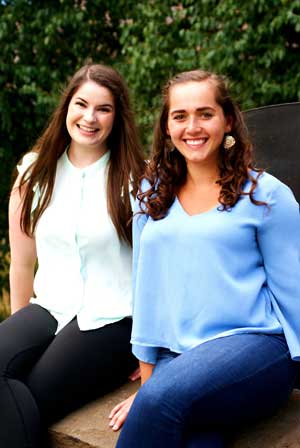
Samantha Kennelly, a rising fifth year medicinal chemistry PhD candidate in Dr. Daniel Harki’s lab and Zoe Koerperich, a recent doctoral graduate in Dr. Carrie Haskell-Luevano’s lab, identified the need for greater equity and support of women in medicinal chemistry. The result of their collaboration is a group grounded in helping other women in the field
When did you start the organization and why?
The Women in Medicinal Chemistry (WiMC) Organization became an official UMN organization in January 2019. However, we had already started networking and launched activities in fall 2018. We noticed underrepresentation of women in the student body of the department, with only 37% of the entire graduate cohort being female. Additionally, few female graduate students were passing their preliminary and qualifying examinations.
What are some of the main goals and activities of the group?
Aspiring to initiate positive change, the organization was created to improve equity for women within the graduate program and foster a supportive environment.
In this organization, we’ve planned networking opportunities with invited female seminar speakers, providing insights on how to navigate a career in science as a woman. We have also encouraged students to attend the Empowering Women in Organic Chemistry Conference in 2019, 2020 and 2021, where we attended career development and female empowerment workshops, partook in networking events, and presented our research.
WiMC has also made a substantial effort to impact the broader scientific community by publishing a perspective detailing the journeys of female students through graduate school in the Journal of Medicinal Chemistry, the leading academic journal in the field. In this publication, we provided a detailed call-to-action for graduate programs to help foster a more inclusive and supportive academic environment from the perspective of recently graduated and current graduate researchers in the hopes of helping future generations succeed in the field. We utilized data from a survey we collected, where data was obtained from five medicinal chemistry programs in the Midwest and recent alumni of the University of Minnesota. Additionally we also reflect on the female perspective within the field of medicinal chemistry.
In response to the aforementioned achievement gap for women in the department, we began providing support to all first- and second-year graduate students as they prepare for their requisite examinations. We have led weekly tutoring sessions for the first-year preliminary exam, have edited original research proposals, and have held practice seminars for the second-year qualifying exams.
Beyond providing academic support, our group also assists with career development. One career development event we hosted this year was taking professional headshots to encourage networking and to maintain active LinkedIn profiles, especially in today’s job climate where having an online presence is important. Finally, within the organization we host social events to help build a sense of belonging and community within the department.
What impact have you seen this group have? And, what future impact do you hope it will have?
Since offering academic assistance through the WiMC tutoring sessions, 100% of medicinal chemistry graduate students have passed their qualifying examinations.
In the future we hope to continue supporting and encouraging women currently in the field of medicinal chemistry as well as engage those of younger generations.
What are you most proud of related to WiMC?
Since starting the WiMC organization, we’ve noticed a greater sense of community and support, not only with the women in the department, but with our male allies as well as post-docs, faculty, and staff.
